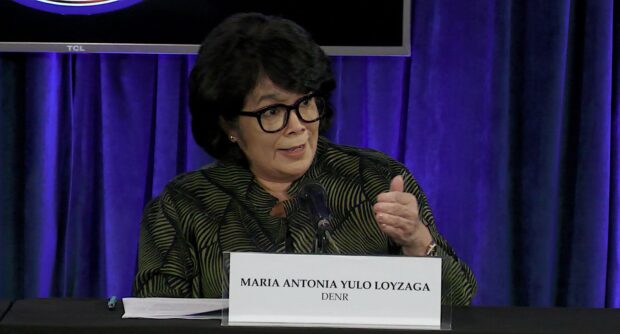PH urges governments to set safeguards vs deep-sea mining activities

DENR Secretary Maria Antonia Yulo-Loyzaga during a press briefing in Malacañang on Wednesday, August 2, 2023. INQUIRER.net/Ryan Leagogo
MANILA, Philippines — Environment Secretary Maria Antonia Yulo Loyzaga flagged the increasing extraction of deep-sea minerals during a side event at the ongoing global climate talks in Dubai, as she cited the need to further study and establish governing policies and rules on the issue.
“We wish to note with concern the lack of knowledge we have of these environments and the consequence of their physical, chemical, and biological disruption,” Loyzaga said during the forum titled “No Paris without the Ocean: Partnerships to Activate Ocean-Climate Solutions at Scale.”
Loyzaga, head of the Philippine delegation to the 28th Conference of the Parties to the UN Framework Convention on Climate Change or COP28, stressed the need to safeguard and restore the “blue carbon ecosystem,” specifically dealing with deep-sea economic activities like mineral extraction.
According to the International Union for Conservation of Nature, deep-sea mining refers to the process of retrieving mineral deposits from the ocean below 200 meters.
There is currently little data that could help in understanding the ecological relationships and impacts associated with deep-sea mining, based on a 2022 policy brief by the United Nations Environment Programme Finance Initiative (UNEP FI).
Article continues after this advertisementDespite this, it said that “current scientific consensus suggests that deep-sea mining will be highly damaging to ocean ecosystems.”
Article continues after this advertisement‘Risk to the ocean’
While there are many existing ocean-linked sectors that could potentially contribute to the “sustainable blue economy,” the UNEP FI said this was not true for all sectors.
“The extraction of nonrenewable marine resources such as oil and gas and seabed mineral deposits in particular poses a significant risk to the ocean and cannot be considered sustainable,” it said.
Loyzaga, for her part, emphasized that countries need to look beyond their national jurisdiction in the high seas to safeguard and protect the integrity of marine ecosystems.
She likewise cited the need to align efforts with the goals stipulated in the Paris Agreement and the High Seas Treaty, or the Agreement on Marine Biodiversity of Areas Beyond National Jurisdiction (BBNJ).
The landmark BBNJ document was agreed upon in June after almost two decades of negotiations. It is the first-ever treaty intended to protect the world’s high seas, or the ocean area beyond the countries’ exclusive economic zones.
As of September, nearly 70 countries, including the Philippines, have ratified the treaty during the UN General Assembly.